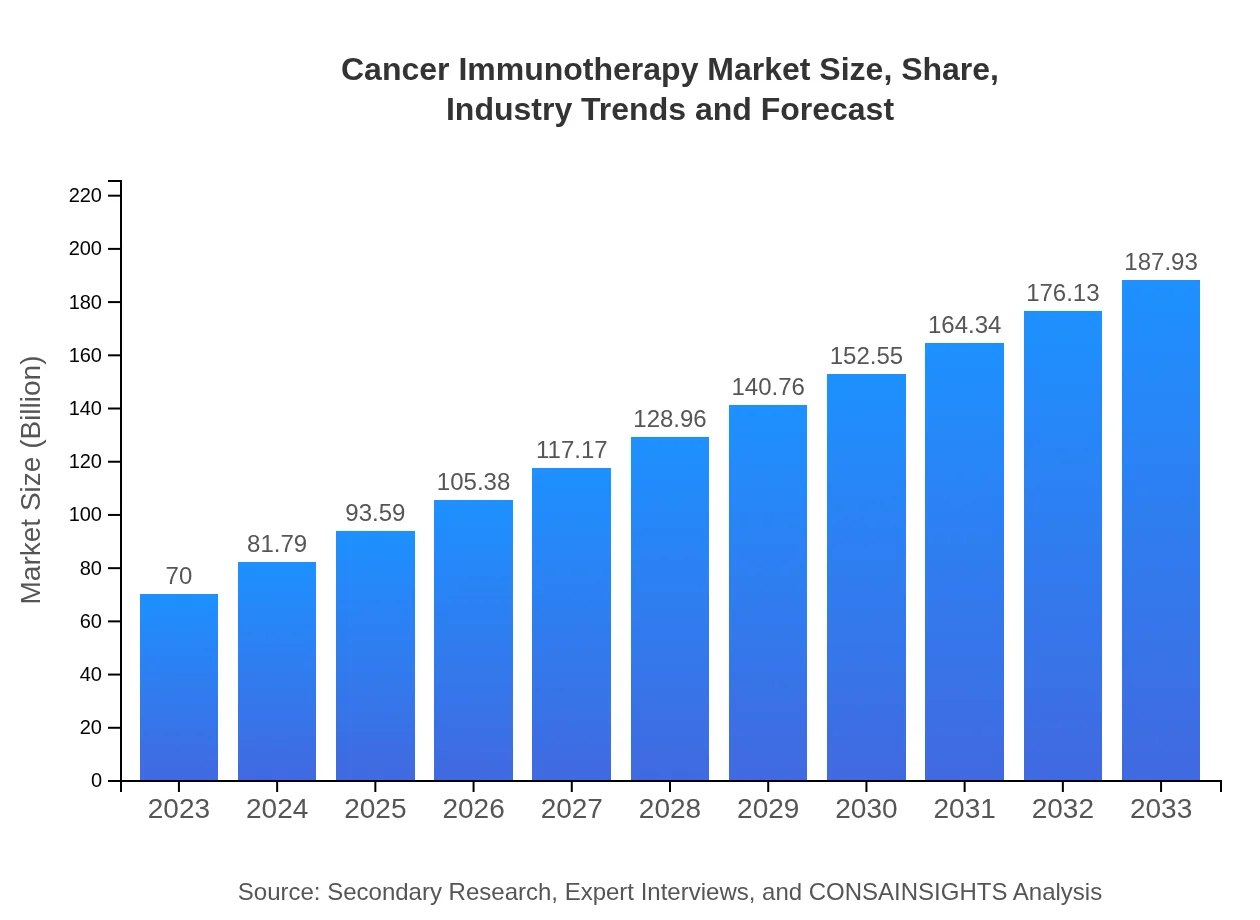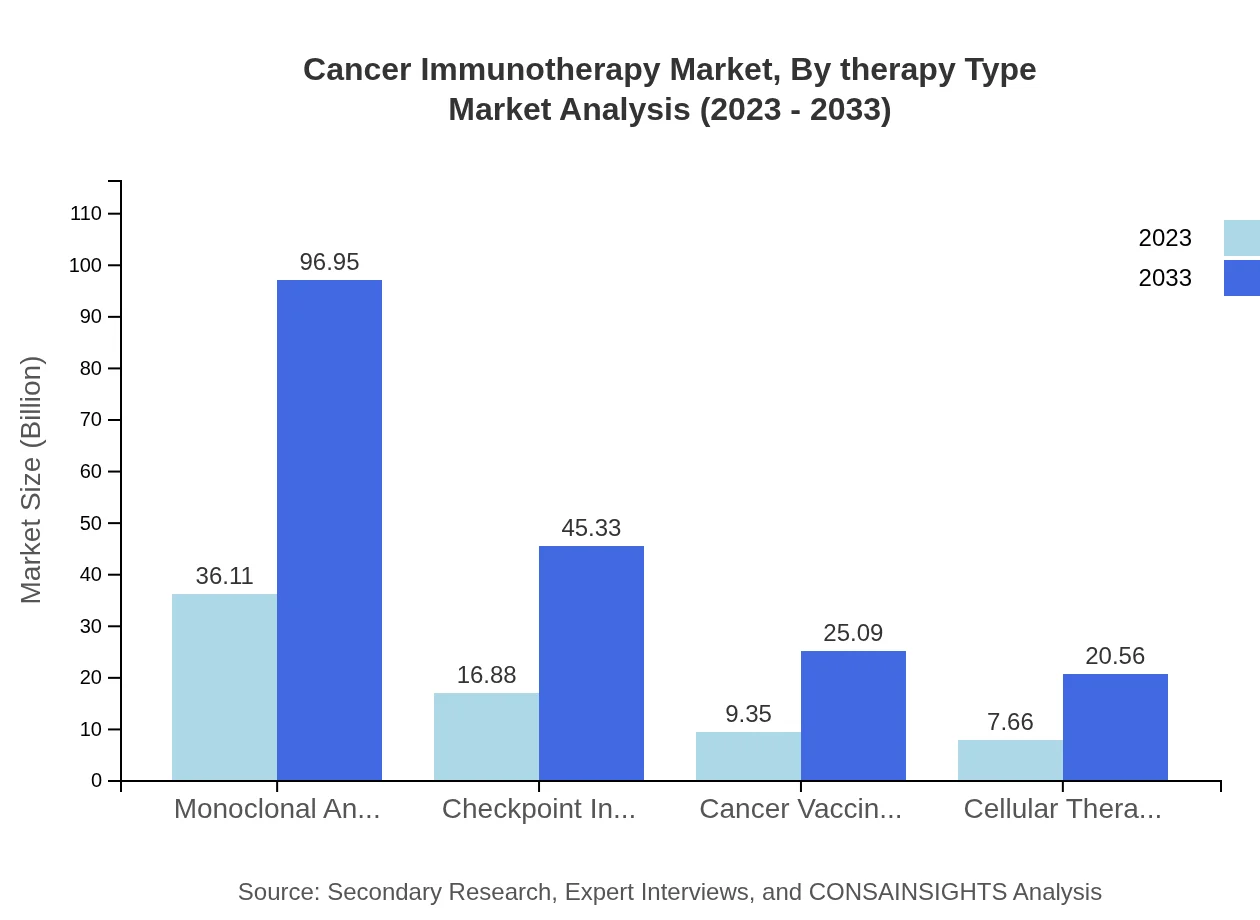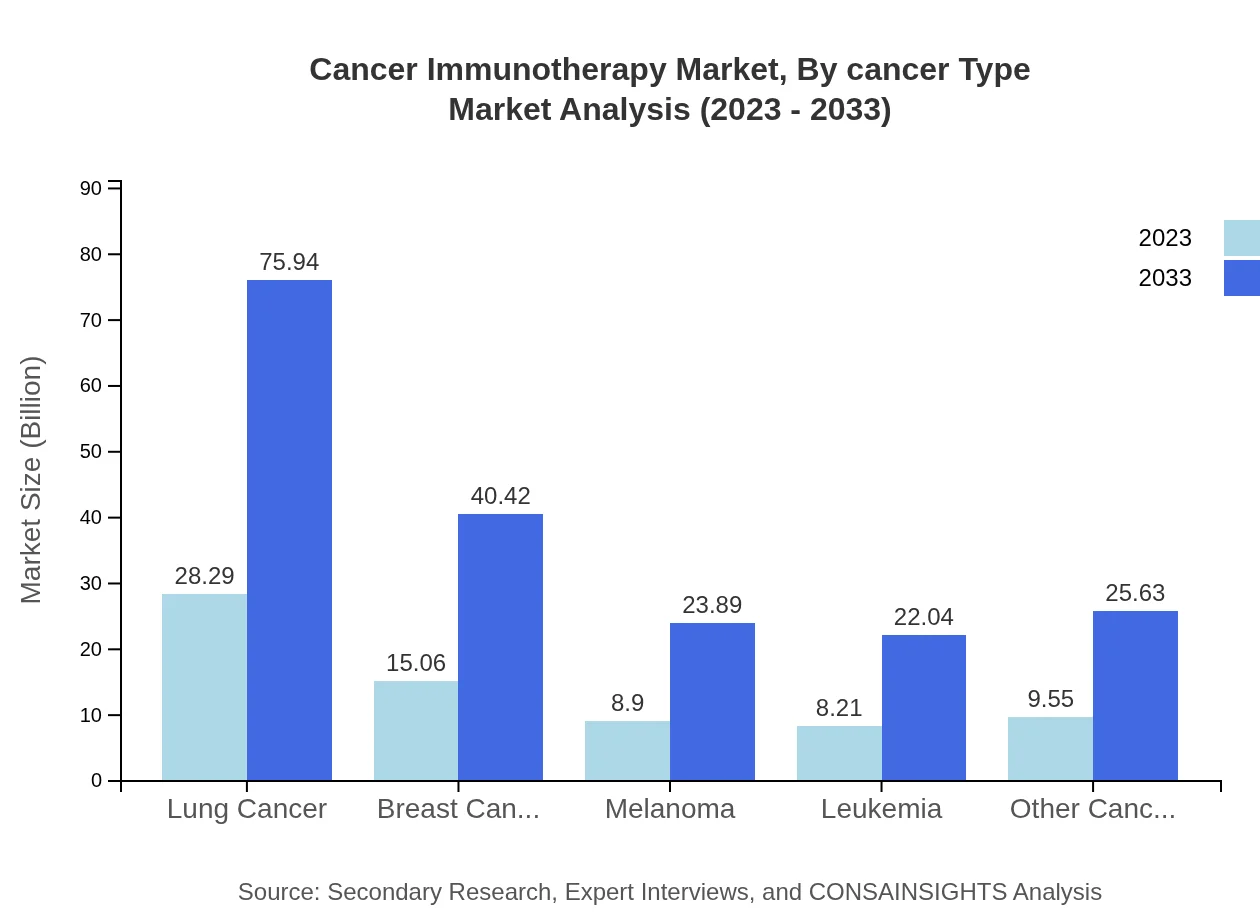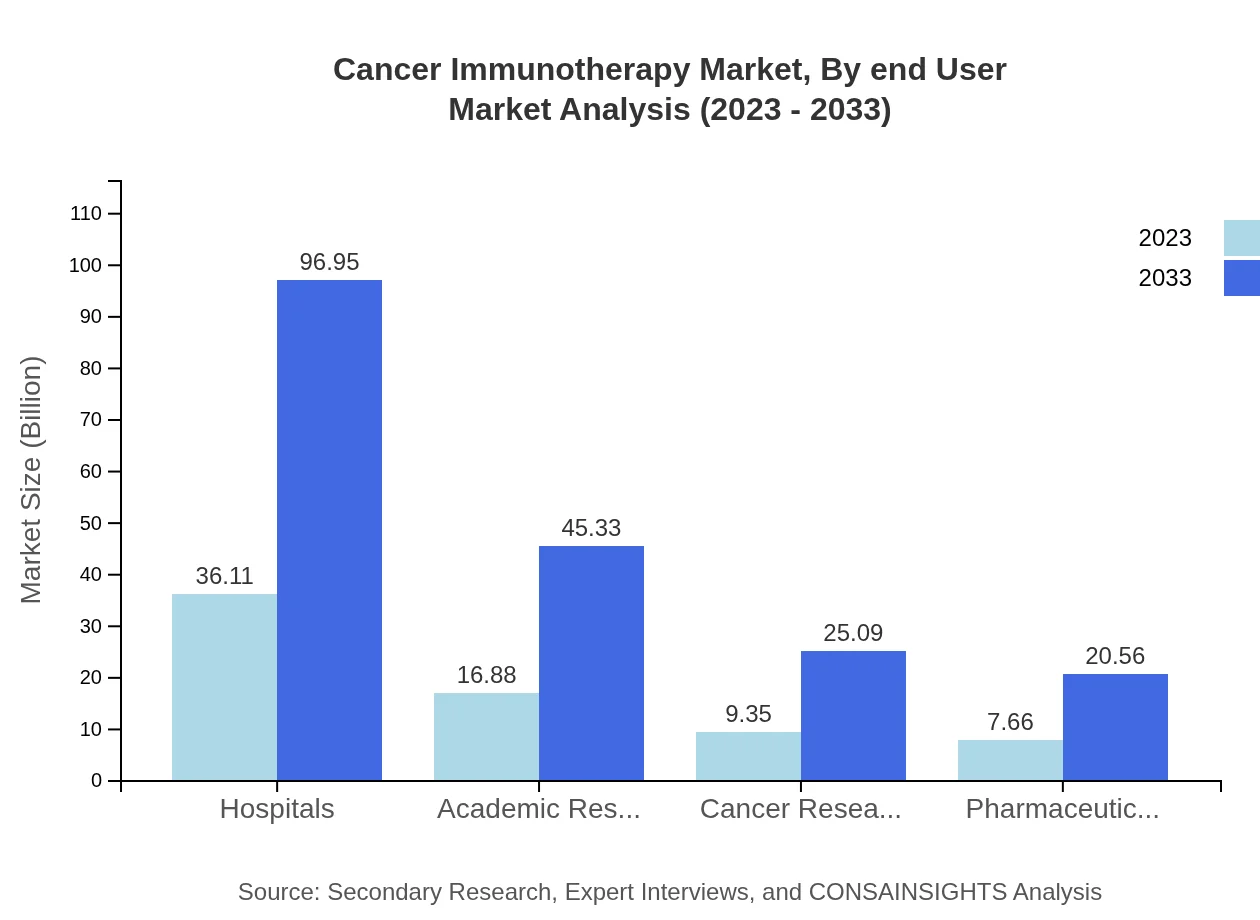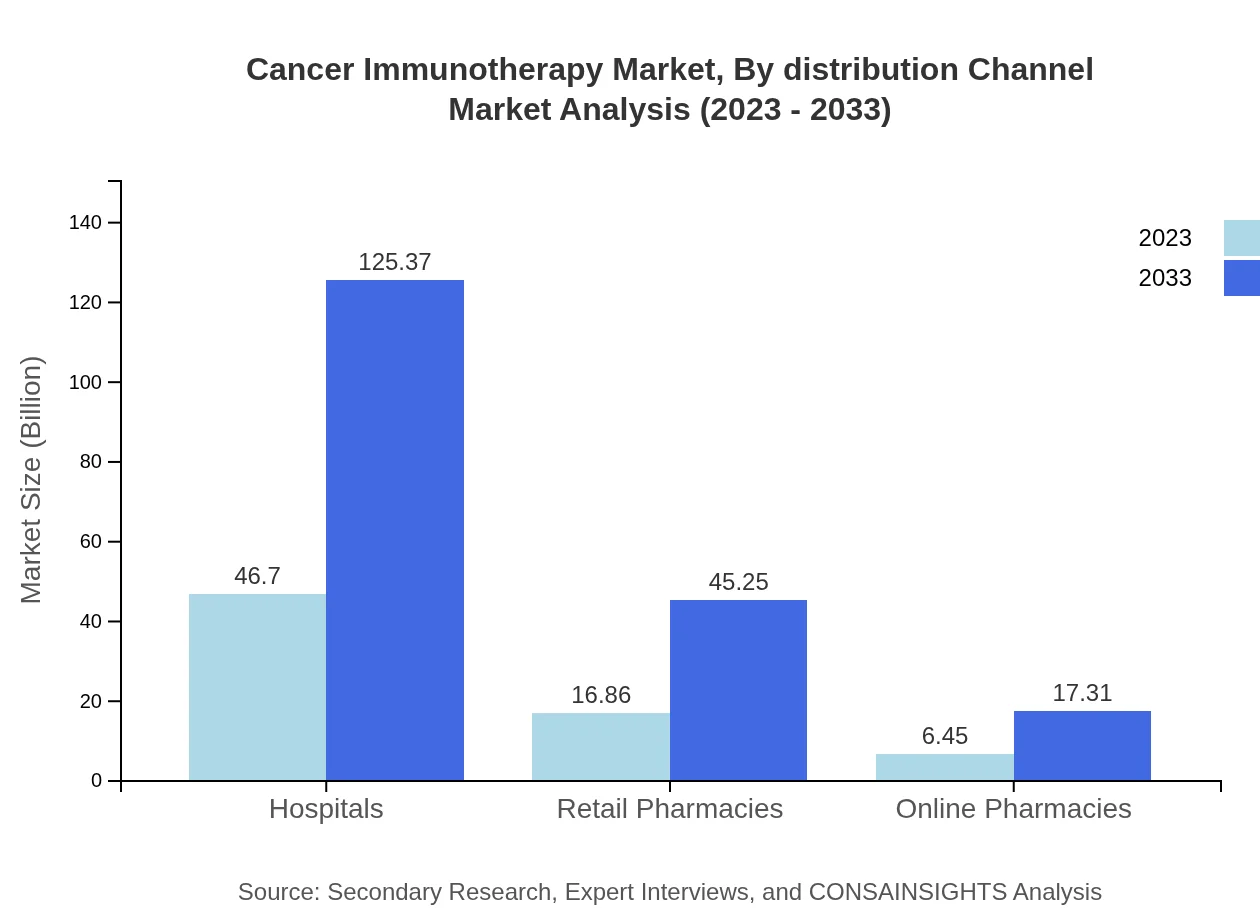Cancer Immunotherapy Market Report
Published Date: 31 January 2026 | Report Code: cancer-immunotherapy
Cancer Immunotherapy Market Size, Share, Industry Trends and Forecast to 2033
This report provides an in-depth analysis of the Cancer Immunotherapy market, covering market sizes, trends, regional insights, and forecasts from 2023 to 2033. It offers valuable insights into the industry dynamics influencing growth and development in this rapidly evolving sector.
| Metric | Value |
|---|---|
| Study Period | 2023 - 2033 |
| 2023 Market Size | $70.00 Billion |
| CAGR (2023-2033) | 10% |
| 2033 Market Size | $187.93 Billion |
| Top Companies | Roche, Bristol-Myers Squibb, Merck & Co., Novartis |
| Last Modified Date | 31 January 2026 |
Cancer Immunotherapy Market Overview
Customize Cancer Immunotherapy Market Report market research report
- ✔ Get in-depth analysis of Cancer Immunotherapy market size, growth, and forecasts.
- ✔ Understand Cancer Immunotherapy's regional dynamics and industry-specific trends.
- ✔ Identify potential applications, end-user demand, and growth segments in Cancer Immunotherapy
What is the Market Size & CAGR of Cancer Immunotherapy market in 2023?
Cancer Immunotherapy Industry Analysis
Cancer Immunotherapy Market Segmentation and Scope
Tell us your focus area and get a customized research report.
Cancer Immunotherapy Market Analysis Report by Region
Europe Cancer Immunotherapy Market Report:
Europe's Cancer Immunotherapy market is projected to grow from approximately $17.35 billion in 2023 to $46.57 billion by 2033. The region is characterized by a well-established healthcare system, high awareness of cancer therapies, and favorable regulatory frameworks. Countries such as Germany, France, and the UK are anticipated to lead in market growth, influenced by increasing incidences of cancer and innovative therapeutic advancements.Asia Pacific Cancer Immunotherapy Market Report:
The Asia Pacific region is projected to experience significant growth in the Cancer Immunotherapy market, expanding from approximately $15.34 billion in 2023 to about $41.19 billion in 2033. The increase is driven by rising healthcare expenditure, increasing cancer prevalence, and growing investment in immunotherapy research across countries like Japan, China, and India. Further, the presence of major pharmaceutical companies and collaborations with local research institutes will augment the market demand.North America Cancer Immunotherapy Market Report:
North America currently dominates the Cancer Immunotherapy market, valued at about $22.49 billion in 2023, with projections reaching $60.38 billion in 2033. The region benefits from advanced healthcare infrastructure, significant R&D investments, and robust government support for cancer research initiatives. Furthermore, the presence of key market players and an increasing number of clinical trials drive innovation and market expansion.South America Cancer Immunotherapy Market Report:
The South America Cancer Immunotherapy market is expected to grow from around $5.17 billion in 2023 to approximately $13.87 billion by 2033. This growth is fueled by an increasing awareness of cancer treatments, a growing patient population, and gradual improvements in healthcare infrastructure. Brazil and Argentina are anticipated to be the leading markets in this region, driven by investments in healthcare and pharmaceuticals.Middle East & Africa Cancer Immunotherapy Market Report:
The Middle East and Africa region reflects steady growth in the Cancer Immunotherapy market, expanding from $9.65 billion in 2023 to about $25.91 billion by 2033. This sector's development is supported by collaborations between international organizations and local governments focusing on improving treatment access and investing in healthcare infrastructure. However, challenges such as limited healthcare expenditure and regulatory hurdles persist.Tell us your focus area and get a customized research report.
Cancer Immunotherapy Market Analysis By Therapy Type
The Cancer Immunotherapy market, by therapy type, is significantly dominated by monoclonal antibodies, valued at approximately $36.11 billion in 2023 and expected to rise to $96.95 billion by 2033. Other key therapy types include checkpoint inhibitors and cancer vaccines, which are gaining traction due to their effectiveness in treating various malignancies. Checkpoint inhibitors represent a growing segment, projected to achieve approximately $16.88 billion in 2023, scaling up to $45.33 billion by 2033.
Cancer Immunotherapy Market Analysis By Cancer Type
Within the Cancer Immunotherapy market by cancer type, lung cancer remains the largest segment with a market size of $28.29 billion in 2023, forecasted to grow to $75.94 billion by 2033. Following closely, breast cancer treatments are expected to progress from $15.06 billion to $40.42 billion, while melanoma, leukemia, and other cancers also contribute significantly to the overall revenue of the market.
Cancer Immunotherapy Market Analysis By End User
Hospitals are the dominant end-user segment in the Cancer Immunotherapy market, with an estimated value of $46.70 billion in 2023, projected to reach $125.37 billion by 2033, accounting for a significant share of the overall market. Academic research institutes and cancer research centers also play crucial roles, focusing on innovation and clinical trial developments across various platforms.
Cancer Immunotherapy Market Analysis By Distribution Channel
Distribution channels in the Cancer Immunotherapy market include hospitals, retail pharmacies, and online pharmacies, with hospitals being the leading channel due to direct administration and availability of therapies. As of 2023, retail pharmacies contribute significantly, valued at $16.86 billion and expected to rise to $45.25 billion, while online pharmacies are gradually expanding their market foothold backed by increasing digital health trends.
Cancer Immunotherapy Market Trends and Future Forecast
Tell us your focus area and get a customized research report.
Global Market Leaders and Top Companies in Cancer Immunotherapy Industry
Roche:
A leading biotechnology company known for its pioneering work in oncological therapies, including the development of advanced monoclonal antibodies and breakthrough checkpoint inhibitors.Bristol-Myers Squibb:
A key player in the immunotherapy segment, known for its innovative drugs like Opdivo and Yervoy, which target various forms of cancer.Merck & Co.:
Developed the successful immunotherapy Pembrolizumab (Keytruda), focusing on advancing cancer treatment through robust clinical research.Novartis:
Engaged in pioneering work related to CAR-T cell therapies and other innovative treatment modalities in the Cancer Immunotherapy sector.We're grateful to work with incredible clients.









FAQs
What is the market size of cancer Immunotherapy?
The global Cancer Immunotherapy market is currently valued at $70 billion and is projected to grow at a CAGR of 10% from 2023 to 2033.
What are the key market players or companies in this cancer Immunotherapy industry?
Key players in the Cancer Immunotherapy industry include major pharmaceutical companies, academic research institutions, and cancer research centers, which play vital roles in development, research, and product distribution.
What are the primary factors driving the growth in the cancer Immunotherapy industry?
Growth in the Cancer Immunotherapy market is driven by increasing cancer incidence rates, advancements in research, positive clinical trial results, and heightened investment in innovative therapies.
Which region is the fastest Growing in the cancer Immunotherapy?
North America shows the fastest growth in the Cancer Immunotherapy market, projected to expand from $22.49 billion in 2023 to $60.38 billion by 2033.
Does ConsaInsights provide customized market report data for the cancer Immunotherapy industry?
Yes, ConsaInsights offers customized market report data, tailored to meet specific client needs within the cancer-immunotherapy sector, including market analysis and forecasts.
What deliverables can I expect from this cancer Immunotherapy market research project?
Expect comprehensive deliverables including detailed reports, market size estimations, growth forecasts, competitive analysis, and strategic recommendations for decision-making.
What are the market trends of cancer Immunotherapy?
Current trends in Cancer Immunotherapy include increasing reliance on monoclonal antibodies, cellular therapies, personalized medicine approaches, and the ongoing development of combination therapies.

